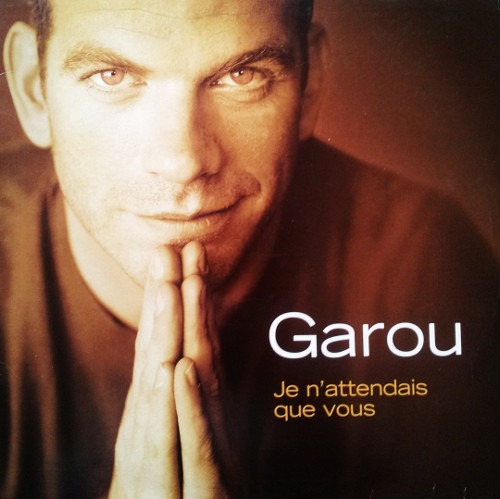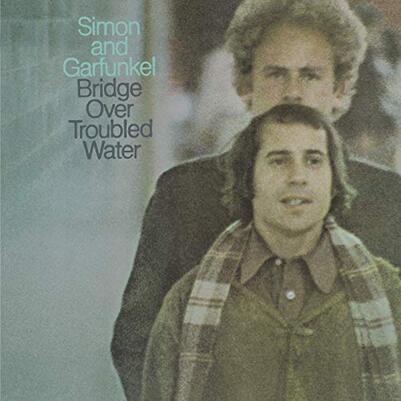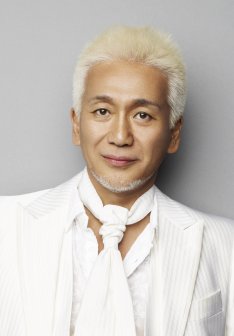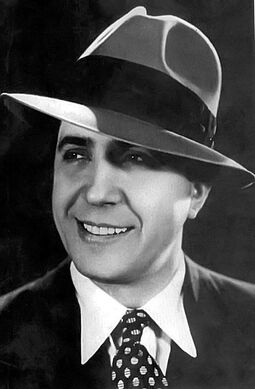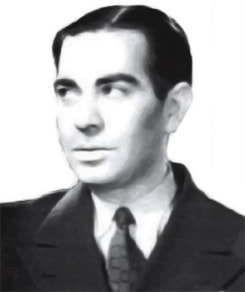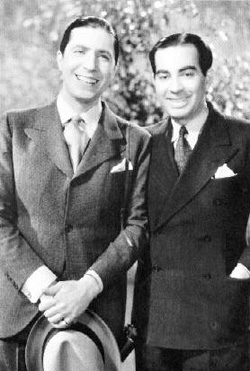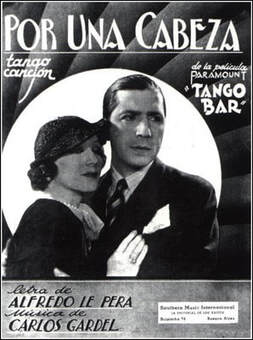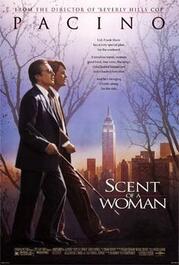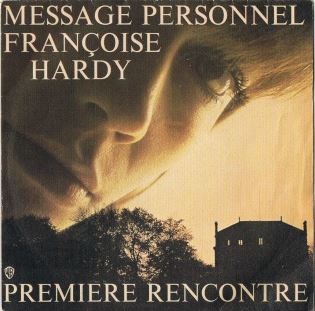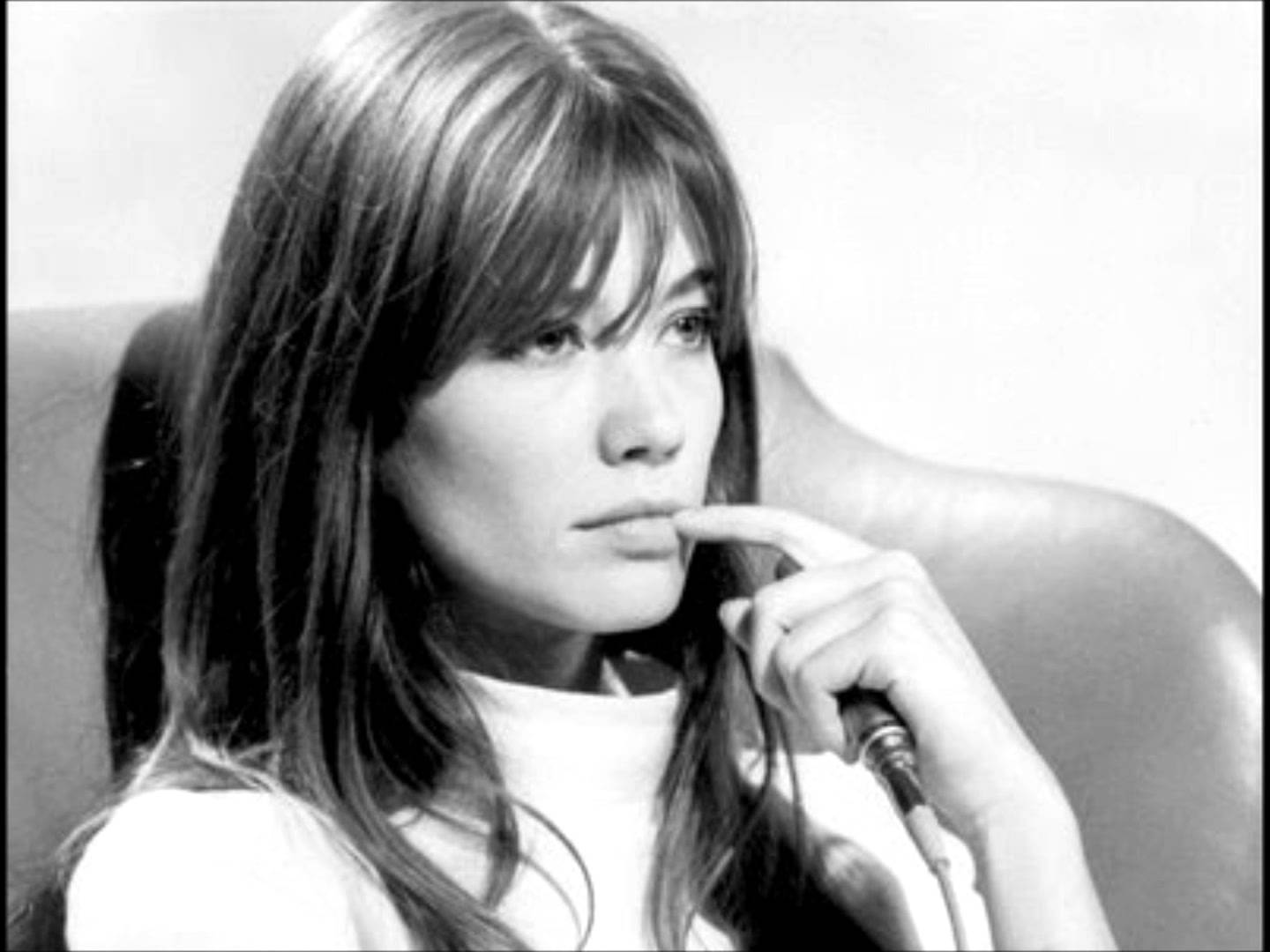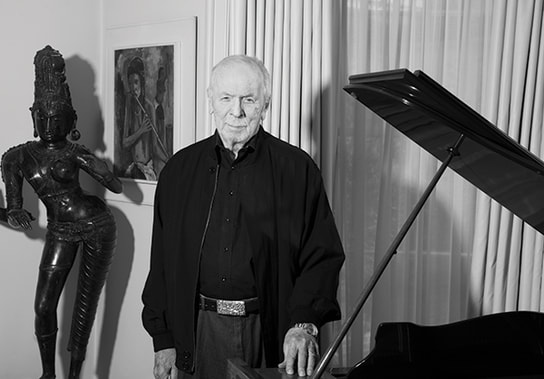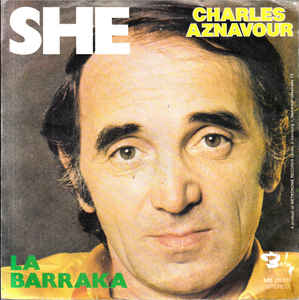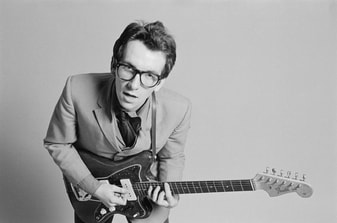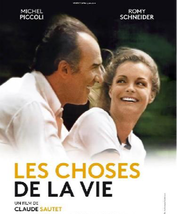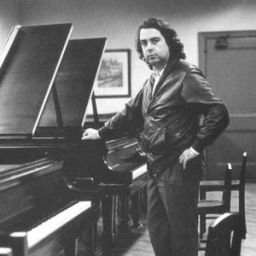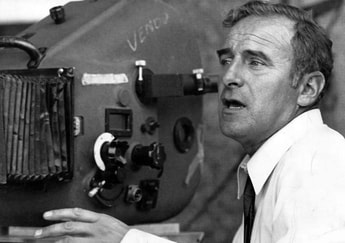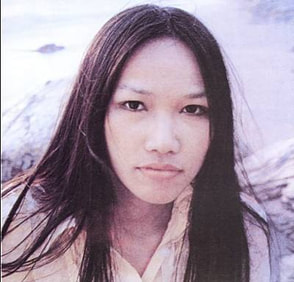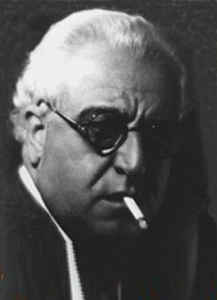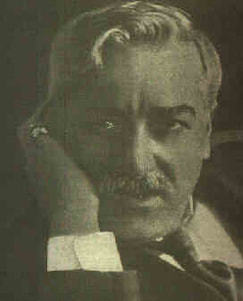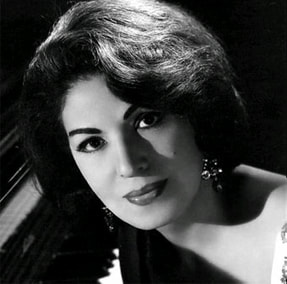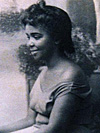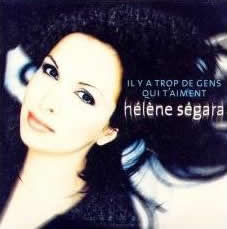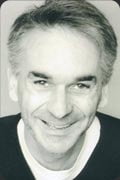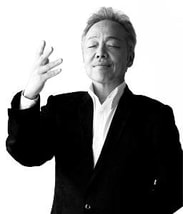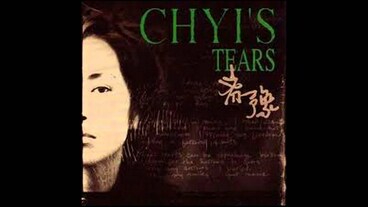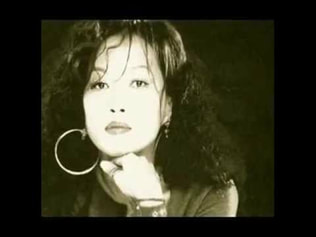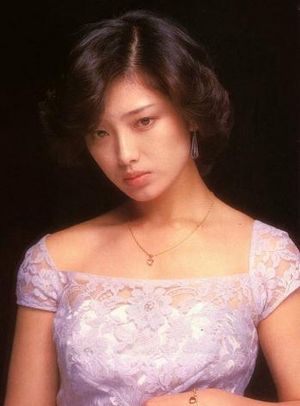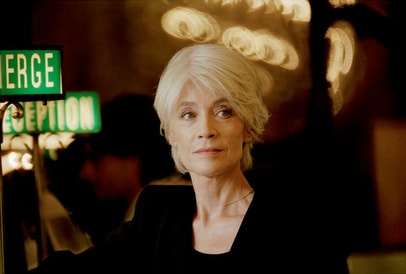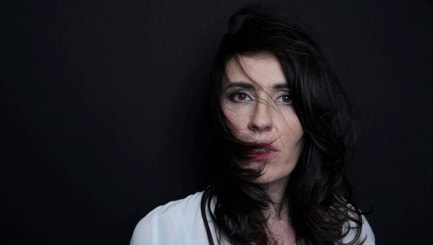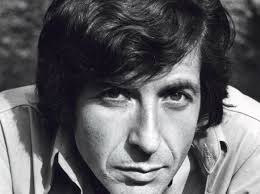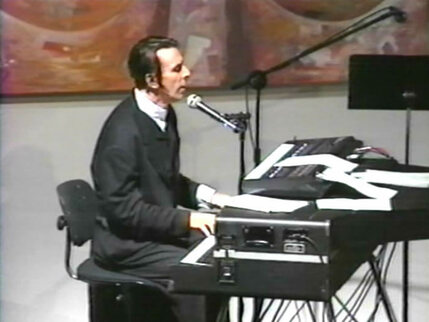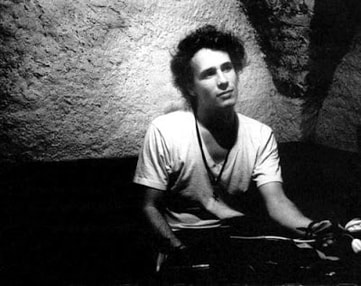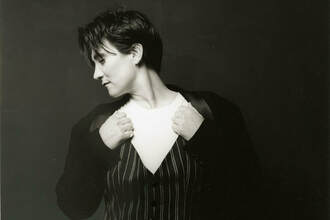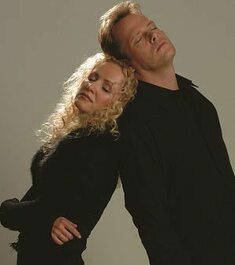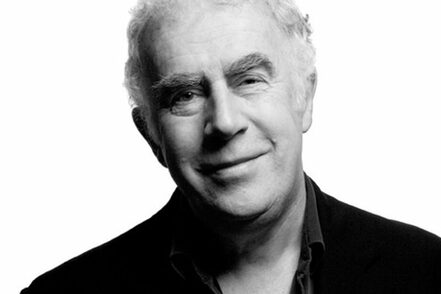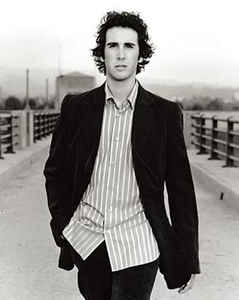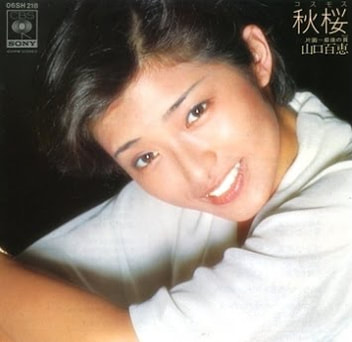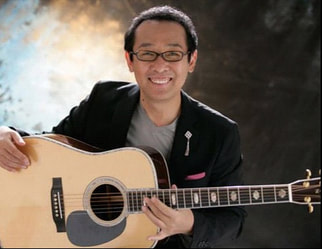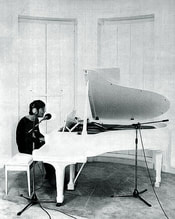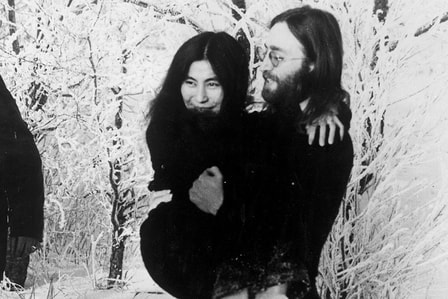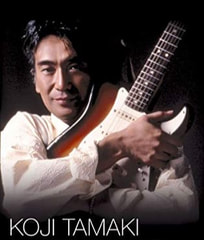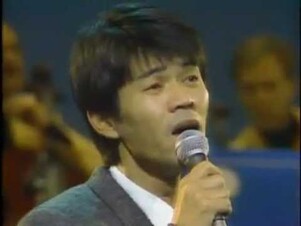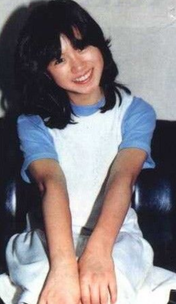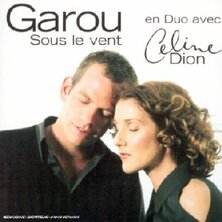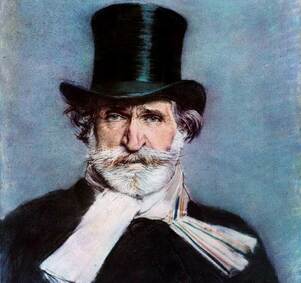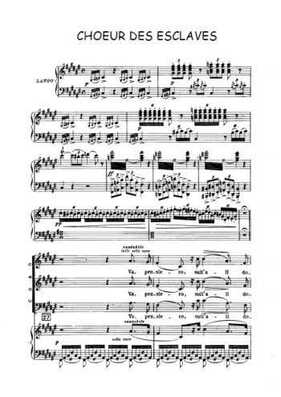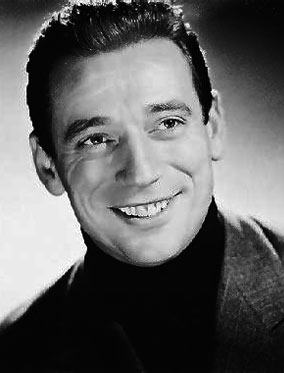Lyrics of Je n'attendais que vous Parole Francais
On garde un soleil Au fond de nous, Un feu qu'on réveille Malgré tout, Malgré les douleurs d'hier Tout à coup on espère Au hasard d'un jour Pareil aux autres, On se sent moins lourd, La vie nous porte Pour un regard de lumière Un seul aveu à faire Je n'attendais que vous Je n'espérais que vous J'ai marché si longtemps Je viens de loin Le monde était grand Et long le chemin Je n'attendais que vous Nulle autre que vous J'attendais votre voix, vos soupirs Donnez-moi votre air, qu'enfin je respire On garde un peu d'or Au fond de l'âme Mais le temps dévore, Éteint la flamme, Jusqu'à ce jour de hasard Et soudain on repart On remplit nos yeux D'autres couleurs, Est-ce qu'on y voit mieux? Est-ce qu'on est meilleur? Quand tout redevient si clair Un seul aveu à faire Je n'attendais que vous Je n'espérais que vous J'ai marché si longtemps Je viens de loin Le monde est trop grand Trop long le chemin Je n'attendais que vous Nulle autre que vous J'attendais votre voix, vos soupirs Donnez-moi votre air, qu'enfin je respire Vous Je n'attendais que vous Je n'espérais que vous J'ai marché si longtemps Je viens de loin Le monde était grand Et long le chemin Je n'attendais que vous Nulle autre que vous J'attendais votre voix, vos soupirs Donnez-moi votre air, qu'enfin je respire Je n'attendais que vous Je n'attendais que vous Au fond de nous Malgré tout Malgré les douleurs Je n'attendais que vous Je viens de loin Je n'espérais N'espérais que vous Je n'attendais que vous Je n'attendais que... Vous... English Translation: We keep a sun Deep inside us A fire that wakes us up Despite everything Despite all the pain of yesterday Suddenly we hope Then one day Looking like any other days We feel less heavy Let life carry us For just one single look with light Just one confession to make I only waited for you I only wished for you I have walked so long I came faraway The world was huge And the road long I only waited for you No one else but you I waited for your voice, your sighs Give me your air so I finally can breathe We keep a little gold In the depth of our soul But time devours everything Extinguishing the flame Until this random day And suddenly we leave again We fill our eyes with other colors, Do we thus see better? Do we thus feel better? When everything becomes so clear again There is only one confession to make I only waited for you I only wished for you I have walked so long I came from faraway The world is too huge The road too long I waited only for you No one else but you I waited for your voice, your sighs Give me your air so I finally can breathe You I only waited for you I only wished for you I have walked so long I came from faraway The world was too huge The road too long I waited only for you No one else but you I waited for your voice, your sighs Give me your air so I finally can breathe I only waited for you I only waited for you In the depth of us Despite everything Despite all the pain I only waited for you I came from faraway I only wished Only wished for you I only waited for you I only waited for...you...
1 Comment
El Cóndor Pasa, Spanish for "The Condor Passes") is an orchestral musical piece from the zarzuela El Cóndor Pasa by the Peruvian composer Daniel Alomía Robles, written in 1913 and based on traditional Andean music, specifically folk music from Peru. Since then, it has been estimated that around the world, more than 4000 versions of the melody have been produced, along with 300 sets of lyrics. In 2004, Peru declared this song as part of the national cultural heritage.This song is now considered the second national anthem of Peru. It is the best-known Peruvian song in the English-speaking world due to a 1970 cover by Simon & Garfunkel on their Bridge over Troubled Water album. Their version is called "El Cóndor Pasa (If I Could)". English Lyrics: I'd rather be a sparrow than a snail Yes I would, if I could, I surely would I'd rather be a hammer than a nail Yes I would, if I only could, I surely would Away, I'd rather sail away Like a swan that's here and gone A man gets tied up to the ground He gives the world its saddest sound Its saddest sound I'd rather be a forest than a street Yes I would, if I could, I surely would I'd rather feel the earth beneath my feet Yes I would, if I only could, I surely would And one of the most beautiful versions, is by sung Italian singer Gigliola Cinquetti with Italian lyrics. Italian lyrics:
L'amore come un condor scenderà Il mio cuor colpirà Poi se ne andrà. La luna nel deserto fiorirà Tu verrai solo un bacio e poi Mi lascerai. Chissà domani dove andrai Che farai? Mi penserai? Lo so, tu non ti fermi mai Ma pensa che io non vivrei Come potrei? Un fiore dal dolore nascerà Il mio cuor pungerà Poi morirà. L'amore come un condor volerà Fin lassù e così mai più Ritornerà. Lo so, tu non ti fermi mai Ma pensa che io non vivrei Come potrei? 作詞:Koji Tamaki & SATOKO ANDO 作曲:Koji Tamaki & SATOKO ANDO Lyrics: レンゲ草で作った首飾り 四つ葉のクローバーはお守りだった 理由もなく手をつないでた 水しぶきを上げて川を渡った シャツの下はこんがりと焼けた肌 太陽がいつも友だちだった 空を仰いで… こんな素直な気持ちでいられるのは 愛する人たちがいたから 今 ふたりがこうしていられるのは 太陽になる時が来たから もっと沢山の歌詞は ※ Mojim.com どんな時も離れないでいようって 森を抜けて風を追いかけた オレンジ色の帰り道 星を見つめて… いつか自然に涙が流れたなら 信じてきたものがあるんだ 今 僕らが優しくいられるなら 太陽になる時が来たんだ いつか自然に涙が流れたなら 信じてきたものがあるんだ 今 僕らが優しくいられるなら 太陽になる時が来たんだ Title: Por una cabeza Lyrics: Alfredo le pera Music: Carlos Gardel Release: 1935 Performers: Carlos Gardel Carlos Gardel (born Charles Romuald Gardès; 11 December 1890 – 24 June 1935) was a French Argentine singer, songwriter, composer and actor, and the most prominent figure in the history of tango. Gardel's baritone voice and the dramatic phrasing of his lyrics made miniature masterpieces of his hundreds of three-minute tango recordings. Together with lyricist and long-time collaborator Alfredo Le Pera, Gardel wrote several classic tangos. For many, Gardel embodies the soul of the tango style. He is commonly referred to as "The King of Tango", "El Mago" (The Wizard), and ironically "El Mudo" (The Mute). Alfredo Le Pera was born in São Paulo, Brazil, the son of Italian immigrants who moved to Buenos Aires, Argentina in 1902. At the beginning of his career, he worked for several Argentinian periodicals as a journalist and theatre critic and in 1928 became involved in the film industry. He worked for Paramount Pictures while living in Paris and in 1932 the studio arranged for him to work with Carlos Gardel, at a time when the company was looking for ways to increase Gardel's international appeal . Le Pera wrote the scripts for a series of films, including Melodía de Arrabal (1933), Cuesta abajo (1934), El Tango en Broadway (1934), El día que me quieras (1935) and Tango Bar (1935), and also wrote the lyrics for tangos composed and performed by Gardel in these films. These tangos would become classics of the genre across the Spanish-speaking world. Gardel and Le Pera were coming to the end of a promotional tour for the film El dia que me quieras when, on Monday, 24 June 1935, the plane in which they were taking off from the airport in Medellin, Colombia crashed into another plane on the runway, killing them both and most of the other passengers on board, including the other musicians travelling with them. The name of the song "Por Una Cabeza" is a Spanish horse-racing phrase meaning "by a head", which refers to a horse winning a race narrowly - by just the length of its head. The lyrics speak of a compulsive horse-track gambler who compares his addiction for horses with his attraction to women. The starting phrase in the B section may be inspired by Mozart's Rondo for violin and orchestra in C major, K. 373. The song was originally composed in A major. It was thereafter adapted to the violin and the piano sometimes in A major, sometimes in G major. Lyrics: Letra Espanol Por una cabeza Por una cabeza de un noble potrillo que justo en la raya afloja al llegar y que al regresar parece decir: no olvides, hermano, vos sabes, no hay que jugar... Por una cabeza, metejon de un dia, de aquella coqueta y risueña mujer que al jurar sonriendo, el amor que esta mintiendo quema en una hoguera todo mi querer. Por una cabeza todas las locuras su boca que besa borra la tristeza, calma la amargura. Por una cabeza si ella me olvida que importa perderme, mil veces la vida para que vivir... Cuantos desengaños, por una cabeza, yo jure mil veces no vuelvo a insistir pero si un mirar me hiere al pasar, su boca de fuego, otra vez, quiero besar. Basta de carreras, se acabo la timba, un final reñido yo no vuelvo a ver, pero si algun pingo llega a ser fija el domingo, yo me juego entero, que le voy a hacer. The music of "Por Una Cabeza" is featured in a famous tango scene in Martin Brest's Scent of a Woman (1992), in the opening scene of Steven Spielberg's Schindler's List (1993) and in James Cameron's True Lies (1994). Title: Message Personnel Lyrics: Michel Berger(singing part), Françoise Hardy(spoken part) Music: Michel Berger Release: November 1973 Performers: Françoise Hardy Message personnel est une chanson de Françoise Hardy qui ferme son album Message personnel, sorti en 1973. Elle est également sortie en single 45 tours avec en face B Première rencontre1. En Allemagne, le titre est placé en face B sous le titre Je veux je ne peux pas si tu crois un jour que je t'aime. La chanson a été écrite par Michel Berger et Françoise Hardy. L'enregistrement a été produit par Michel Berger. La chanson commence par une introduction parlée d' une minute et demi, écrite par Françoise Hardy, à la demande de Michel Berger qui souhaitait une participation personnelle de la chanteuse à cette chanson qu'il a par ailleurs écrite et composée. Le texte, adressée à une personne qui n'est pas nommée, qui est vouvoyée au début, et tutoyée à la fin du texte, reprend les thématiques souvent abordées par Françoise Hardy : la difficulté à communiquer, les relations amoureuses naissantes. Le titre de la chanson n'apparaît nulle part dans le texte, il a été suggéré par Françoise Hardy elle-même, et renforce le sens du prologue, qui est par ailleurs le seul texte qu'elle a écrit sur tout l'album. Il existe également une version anglaise, publiée en 45 tours en 1974 ; par ailleurs, une version instrumentale (mais avec les chœurs) qui présente quelques différences avec celle qu'on entend dans la version originale a été publiée sur l'édition anniversaire des 40 ans de l'album.. Message personnel is a song by Françoise Hardy from her 1973 album Message personnel produced by Michel Berger. It was also released as a single. It was a year of big change for her both personally and professionally. She was pregnant with her son Thomas and professionally, Françoise Hardy was in the process of changing her record company. It was then she met Michel Berger, and was really impressed by Véronique Sanson's first album produced by Berger, so she asked him to write songs for her. It would be a turning point for Françoise Hardy as an artist. According to her, after meeting Michel Berger she would become more an interpreter than writer. LyricsParoles Francois: Au bout du téléphone, il y a votre voix Et il y a les mots que je ne dirai pas Tous ces mots qui font peur quand ils ne font pas rire Qui sont dans trop de films, de chansons et de livres Je voudrais vous les dire Et je voudrais les vivre Je ne le ferai pas Je veux, je ne peux pas Je suis seule à crever et je sais où vous êtes J'arrive, attendez-moi, nous allons nous connaître Préparez votre temps, pour vous j'ai tout le mien Je voudrais arriver Je reste, je me déteste Je n'arriverai pas Je veux, je ne peux pas Je devrais vous parler Je devrais arriver Ou je devrais dormir J'ai peur que tu sois sourd, j'ai peur que tu sois lâche J'ai peur d'être indiscrète Je ne peux pas vous dire que je t'aime, peut-être Mais si tu crois un jour que tu m'aimes Ne crois… English Translation:
{spoken:} at the end of the line is the sound of your voice and the words that I can't that I never shall say those words that people fear when they don't make them laugh that have been too often in books, songs and movies words I'd like to tell you and words I'd like to live words I never shall say : I want to, I just can't I'm so lonesome I could die and I know where you are I'm coming, wait for me, I know you, you know me Will you spare me some time 'cause I'll give you all mine I'd like to come to you, but I always stay I never come to you : I want to, I just can't I ought to speak to you, I ought to be with you or at least try to sleep I'm afraid you'll be deaf, I'm afraid you'll escape afraid I'm too forward and I never shall say that I've fallen for you but if you think you could love me tomorrow don't be afraid of memories and sorrow we'll flee the past where we can leave tomorrow come and rescue me if you think you could love me tomorrow don't be afraid if the path looks narrow between the past and the life tomorrow come and rescue me if you're fed up with your life and find no way when every day is just another yesterday think of me, think of me Title: She Lyrics: Charles Aznavour, Herbert Kretzmer Music: Charles Aznavour Release: 1974 single Performers: Charles Aznavour, Elvis Costello "She" is a song written by Herbert Kretzmer for Charles Aznavour and released by Aznavour as a single in 1974. The song was written in English as a theme tune for the British TV series Seven Faces of Woman. Aznavour also recorded it in other languages including French: "Tous les visages de l'amour" (All the Faces of Love), German: "Sie", Italian: "Lei" and Spanish"Ella" respectively. He also recorded the song in a more uptempo French version with different lyrics, which was titled "Elle". Elvis Costello recorded a cover version of the song in 1999. This version, produced by Trevor Jones, was featured over the final sequence of the film Notting Hill, and charted throughout Europe. Elvis Costello (born 25 August 1954) is an English singer-songwriter. He began his career as part of London's pub rock scene in the early 1970s and later became associated with the first wave of the British Punk/New Wave movement of the mid-to-late 1970s. His critically acclaimed debut album, My Aim Is True, was recorded in 1976. Shortly after recording his first album, he formed The Attractions as his backing band, they would tour and record together for the better part of a decade, though differences between Costello and members of The Attractions caused them to split by 1986. Steeped in word play, the vocabulary of Costello's lyrics is broader than that of most popular songs. His music has drawn on many diverse genres; one critic described him as a "pop encyclopaedia", able to "reinvent the past in his own image". Costello has won multiple awards in his career, including a Grammy Award, and has twice been nominated for the Brit Award for Best British Male. LyricsParole Francaise: tous les visages de l'amour Toi, parée de mille et un attraits Je ne sais jamais qui tu es Tu changes si souvent de visage et d'aspect Toi, quel que soit ton âge et ton nom Tu es un ange ou le démon Quand pour moi tu prends tour à tour Tous les visages de l'amour Toi, si Dieu ne t'avait modeler Il m'aurait fallut te créer Pour donner à ma vie sa raison d'exister Toi qui est ma joie et mon tourment Tantôt femme et tantôt enfant Tu offres à mon coeur chaque jour Tous les visages de l'amour Moi je suis le feu qui grandit ou qui meurt Je suis le vent qui rugis ou qui pleure Je suis la force ou la faiblesse Moi je pourrais défier le ciel et l'enfer Je pourrais dompter la terre et la mer Et réinventer la jeunesse Toi, viens fais de moi ce que tu veux Un homme heureux ou malheureux Un mot de toi, je suis poussière ou je suis Dieu Toi sois mon espoir sois mon destin J'ai si peur de mes lendemains Montre à mon âme sans secours Tous les visages de l'amour Toi, tous les visages de l'amour English lyrics (original: written by Herbert Kretzmer) She may be the face I can't forget The trace of pleasure or regret May be my treasure or the price I have to pay She may be the song that summer sings Maybe the chill that autumn brings Maybe a hundred different things Within the measure of a day She may be the beauty or the beast May be the famine or the feast May turn each day into a Heaven or a Hell She may be the mirror of my dreams A smile reflected in a stream She may not be what she may seem Inside her shell She, who always seems so happy in a crowd Whose eyes can be so private and so proud No one's allowed to see them when they cry She may be the love that cannot hope to last May come to me from shadows in the past That I remember 'till the day I die She maybe the reason I survive The why and wherefore I'm alive The one I'll care for through the rough in many years Me, I'll take her laughter her tears And make them all my souvenirs And where she goes I've got to be The meaning of my life is She, she Oh, she Letras (Spanish translation):
Ella, puede ser el rostro que no puedo olvidar, un rastro de placer del que me arrepiento, puede ser mi tesoro o el precio a pagar, puede ser la canción que canta Salomón, puede ser el frescor que trae el otoño, puede ser un centenar de cosas tristes a lo largo de un día. Ella, puede ser la bella o la bestia, puede ser la hambruna o el banquete, puede convertir cada día en cielo o infierno. Ella puede ser el espejo de mis sueños, la sonrisa reflejada en una corriente de agua, ella puede no ser lo que quizás parece, dentro de su caparazón. Ella, que siempre parece tan felíz y orgullosa, cuyo ojos pueden ser tan discretos y orgullosos, a nadie se le permite verlos cuando llora. Ella puede ser el amor que puede y espera durar, puede venir a mi desde las sombras del pasado que recordaré hasta el día de mi muerte. Ella, puede ser la razón por la que sobrevivo el dónde y por qué estoy vivo. Por la que me preocuparé en los años duros y lluviosos, yo, yo haré frente a su risa y a sus lágrimas, y haré de ellas mi souvenir, a donde vaya yo tengo que ir, el sentido de mi vida es... Ella, ella, oh, ella. Title: La Chanson d'Hélène Lyrics: Jean-Louis Dabadie Music: Philippe Sarde Release: 1970, theme song of French film Les Choses de la vie Performers: Romy Schneider et Michel Piccoli Les Choses de la vie (The Things of Life)is a 1970 French film directed by Claude Sautet. Based on the novel Les Choses de la vie (English title Intersection) by Paul Guimard, the film circles around a car accident experienced by the main character, and the events before and after it. The structure of the film involves frequent jumps in time - between the time of, and after, the car crash, and before the crash. The opening sequence jumps between the period immediately after the crash, and the crash itself. In the French countryside on a summer morning, a lorry full of pigs stalls at a crossroads. An Alfa Romeo Giulietta Sprint swerves to avoid it and crashes into an orchard, hurling the driver (Michel Piccoli) onto the grass. As he drifts in and out of consciousness, he revisits the essential things which make up his life. A Paris architect in his forties driving to a meeting at Rennes, he had quarrelled with his lover Hélène (Romy Schneider) the previous night. They were due to leave together for a job he was offered in Tunis but he hadn't signed the documents. But he had agreed to take his teenage son Bertrand, who lived with his estranged wife Catherine, for a holiday in the family's holiday home on the Île de Ré. Stopping at a café, he wrote to Hélène calling everything off, but did not post the letter. Driving past a wedding, he decides that the letter was quite wrong and he should marry Hélène. Rushed to hospital in Le Mans, he does not recover. As his widow, Catherine is given his effects, including the unsent letter to Hélène. Catherine is reading it when she sees Hélène arriving. She tears it to pieces, and Hélène is told by a nurse that she is too late. The theme song La Chanson d'Hélène is written like a dialogue between the two main characters expressing their feeling towards each other. And it was sung by the two actors Romy Schneider and Michel Piccoli. The film was nominated for the top award (the Palme d'Or) at the 1970 Cannes Film Festival. Lyrics Paroles Francais La Chanson d'Hélène Ce soir nous sommes septembre Et j'ai fermé ma chambre Le soleil n'y entrera plus Tu ne m'aimes plus Là-haut un oiseau passe comme une dédicace Dans le ciel Tu ne m'aimes plus Je t'aimais tant Hélène Il faut se quitter Les avions partiront sans nous Je ne sais plus t'aimer Hélène Avant dans la maison j'aimais quand nous vivions Comme un dessin d'enfant Tu ne m'aimes plus Je regarde le soir tomber dans les miroirs C'est la vie C'est mieux ainsi Hélène C'était l'amour sans amitié Il va falloir changer de mémoire Je ne t'écrirai plus Hélène L'histoire n'est plus à suivre et j'ai fermé le livre Le soleil n'y entrera plus Tu ne m'aimes plus English Translation:
Hélène's song It's September night tonight and I have closed the bedroom The sun will not enter there any more And you do not love me any more Up there in the sky, A bird is passing by like a dedication You do not love me anymore I loved you so Hélène It has to stop The airplanes will leave without us I do not know how to love you any more Hélène Previously in the home I loved it when we lived together like a child's drawing You do not love me anymore I watched how the night fall into the mirror This is life It's better like this Hélène It was love without friendship We must change our memory I will not write to you any more Hélène The story will not continue and I have closed the book The sun will not enter there any more You don't love me any more Title: Koibito yo 恋人よ Lyrics: Mayumi Itsuwa 五輪 真弓(いつわ まゆみ) Music: Mayumi Itsuwa 五輪 真弓(いつわ まゆみ) Release: 21 August 1980 Performers: Mayumi Itsuwa 五輪 真弓(いつわ まゆみ) lyricsJapanese Romaji:
Kareha chiru yuugure wa Kuruhi no samusa wo monogatari Ame ni kowareta benchi niwa Ai wo sasayaku uta mo nai Koibito yo, soba ni ite Kogoeru watashi no soba ni ite yo Soshite hitokoto kono wakarebanashi ga Joudan dayo to waratte hoshii Jarimichi wo kakeashi de Marason bito ga yuki sugiru Marude boukyaku nozomu yoni Tomaru watashi wo sasotteru Koibito yo, sayonara Kisetsu wa megutte kuru keredo Anohi no hutari yoi no nagareboshi Hikatte wa kieru mujou no yumeyo Koibito yo, soba ni ite Kogoeru watashi no soba ni ite yo Soshite hitokoto kono wakarebanashi ga Joudan dayo to waratte hoshii Title: Torna a Surriento (Come back to Sorrento) Lyrics: Giambattista De Curtis Music: Ernesto De Curtis Release: 1902 Performers: Frank Sinatra, Beniamino Gigli, Elvis Presley, Dean Martin, Jerry Vale, Enrico Caruso, José Carreras, Plácido Domingo, Luciano Pavarotti, Ruggero Raimondi, Meat Loaf, Mario Lanza, Franco Corelli, Nino Martini, Robertino Loreti, Giuseppe Di Stefano, Muslim Magomayev, Francesco Albanese, Jerry Adriani, Roberto Carlos, Alfie Boe, Anna Calvi, Karel Gott, IlVolo and Norton Buffalo with George Kahumoku, Jr. "Torna a Surriento" is a Neapolitan song composed in 1902 by Italian musician Ernesto De Curtis to words by his brother, the poet and painter Giambattista De Curtis. The song was copyrighted officially in 1905, and has become one of the most popular songs of this traditional genre, which include others such as O sole mio, Funiculì funiculà, and Santa Lucia. La canzone fu presentata in pubblico per la prima volta nel 1902, eseguita probabilmente dalla coppia Giovanni Ambrosini e Maria Cappiello, quando il presidente del consiglio Giuseppe Zanardelli alloggiò all'hotel di Guglielmo Tramontano, allora sindaco di Sorrento. Fu annunciato che il brano era stato composto su richiesta di Tramontano, per ricordare a Zanardelli di mantenere la promessa di far realizzare una serie di opere pubbliche necessarie a Sorrento tra le quali la più importante era la rete fognaria all'epoca inesistente. In realtà una ricerca più recente indica che i fratelli depositarono una copia del brano nel 1894, ovvero otto anni prima dell'esecuzione pubblica, e che quindi il brano fu soltanto riadattato per l'occasione. lyricsItalian Napolitan Vide 'o mare quant’è bello, spira tantu sentimento, Comme tu a chi tieni mente, Ca scetato 'o fai sunnà. Guarda gua' chistu ciardino; Siente, sie’ sti ciur' arance: Nu prufumo accussi fino Dinto 'o core se ne va… E tu dice: "I’ parto, addio!" T’alluntane da stu core… Da sta terra del l’ammore… Tieni 'o core 'e nun turnà? Ma nun me lassà, Nun darme stu turmiento! Torna a Surriento, Famme campà! Vid'o mare de Surriento, che tesoro tene nfunno: chi ha girato tutto 'o munno nun l'ha visto comme'a ccà. Vide attuorno sti Sirene, ca te guardano 'ncantate, e te vonno tantu bene... Te vulessero vasà. E tu dice: "I' parto, addio!" T'alluntane da stu core Da sta terra de l'ammore Tiene 'o core 'e nun turnà? Ma nun me lassà, Nun darme stu turmiento! Torna a Surriento, Famme campà! English translation:
Come Back to Sorrento (by Claude Aveling) Look at the sea, how beautiful it is, it inspires so many emotions, like you do with the people you look at, who you make to dream while they are still awake. Look at this garden and the scent of these oranges, such a fine perfume, it goes straight into your heart, And you say: "I am leaving, goodbye." You go away from this heart of mine, away from this land of love, And you have the heart not to come back. But do not go away, do not give me this pain. Come back to Surriento, let me live! Look at the sea of Surriento, what a treasure it is! Even who has travelled all over the world, he has never seen a sea like this one. Look at these mermaids that stare, amazed, at you, that love you so much. They would like to kiss you, And you say: "I am leaving, goodbye." You go away from my heart, away from the land of love, And you have the heart not to come back. But please do not go away, do not give me this pain. Come back to Surriento, let me live! Title: Besame mucho Lyrics: Consuelo Velázquez Music: Consuelo Velázquez Release: 1941 Performers:
«Bésame mucho» es el título de una canción escrita en 1940 por la pianista y compositora mexicana Consuelito Velázquez (1916-2005). Rápidamente se convirtió en una de las más populares del siglo XX. La canción fue escrita por la jalisciense Consuelito Velázquez y el primero en grabarla fue Emilio Tuero.2 Con el tiempo, la canción fue pasando de un artista a otro con diferentes adaptaciones, siendo la versión de Pedro Infante una de las más conocidas, así como una versión en inglés a cargo de The Beatles. "Bésame Mucho" ("Kiss me a lot") is a song written in 1940 by Mexican songwriter Consuelo Velázquez. A famous version is sung by Trio Los Panchos. It is one of the most famous boleros, and was recognized in 1999 as the most sung and recorded Mexican song in the world. According to Velázquez herself, she wrote this song even though she had never been kissed yet at the time, and kissing, as she heard, was considered a sin. She was inspired by the piano piece "Quejas, o la Maja y el Ruiseñor", from the 1911 suite Goyescas by Spanish composer Enrique Granados, which he later also included as "Aria of the Nightingale" in his 1916 opera of the same name. lyrics:Spanish/letras espanol: Besame, Besame mucho Como si fuera ésta noche La última vez Besame, besame mucho Que tengo miedo a perderte Perderte después Besame, Besame mucho Como si fuera ésta noche La última vez Besame, besame mucho Que tengo miedo a perderte Perderte después Quiero tenerte muy cerca Mirarme en tus ojos Verte junto a mi Piensa que tal vez mañana Yo ya estaré lejos, Muy lejos de ti Besame, Besame mucho Como si fuera ésta noche La última vez Besame, besame mucho Que tengo miedo a perderte Perderte después Besame, besame mucho Que tengo miedo a perderte Perderte después Que tengo miedo a perderte Perderte después English translation: Kiss me, kiss me a lot, As if tonight was the last time. Kiss me, kiss me a lot, Because I fear to lose you, To lose you again. Kiss me, kiss me a lot, As if tonight was the last time. Kiss me, kiss me a lot, Because I fear to lose you, To lose you again. I want to have you very close To see myself in your eyes, To see you next to me, Think that perhaps tomorrow I already will be far, very far from you. Kiss me, kiss me a lot, As if tonight was the last time. Kiss me, kiss me a lot, Because I fear to lose you, To lose you again. Kiss me, kiss me a lot, Because I fear to lose you, To lose you again. French / Parole Francais: Embrasse-moi, embrasse-moi fort comme si s'était cette nuit la dernière fois. Embrasse-moi, embrasse-moi fort parce que j'ai peur de te perdre de te perdre plus tard Embrasse-moi, embrasse-moi fort comme si s'était cette nuit la dernière fois Embrasse-moi, embrasse-moi fort parce que j'ai peur de te perdre de te perdre plus tard Je veux te serrer dans mes bras [Lit: te tenir très proche] me voir dans tes yeux t'avoir [LIt: te voir] contre moi Pense que peut-être demain je serai déjà loin très loin de toi Embrasse-moi, embrasse-moi fort comme si s'était cette nuit la dernière fois Embrasse-moi, embrasse-moi fort parce que j'ai peur de te perdre de te perdre plus tard Embrasse-moi, embrasse-moi fort parce que j'ai peur de te perdre de te perdre plus tard Embrasse-moi, embrasse-moi fort parce que j'ai peur de te perdre de te perdre plus tard English Lyrics
Besame besame mucho Each time I cling to your kiss I hear music divine Besame besame mucho Hold me my darling and say that you'll always be mine This joy is something new my arms enfolding you, never knew this thrill before Whoever thought I'd be holding you close to me whispering you I adore Dearest one if you should leave me Each little dream would take wing and my life would be through Besame besame mucho Love me forever and make all my dreams come true Besame besame mucho Love me forever and make all my dreams come true Title: Il y a trop de gens qui t'aiment Lyrics: Christian Vié Music: Thierry Geoffroy Release: 2000, album Au nom d'une femme Performers: Hélène Ségara ll y a trop de gens qui t'aiment est une chanson écrite par Christian Vié, composée par Thierry Geoffroy et interprétée par Hélène Ségara. Elle figure sur l'album Au nom d'une femme dont elle est le premier extrait en single le 9 novembre 1999. Il y a trop de gens qui t'aiment is the name of a 1999 song recorded by French artist Hélène Ségara. It was the first single from her second studio album, Au Nom d'une Femme, on which it features as first track. Released in November 1999, the song became a hit in Belgium (Wallonia) and France, topping the singles charts. The song was written by Christian Vié and the music composed by Thierry Geoffroy. This ballad deals with a love that is not shared: indeed, in the lyrics, Ségara observes the man she loves, and describes his actions, but as he is surrounded by many other people, he does not pay attention to her. The text "contrasts the coldness of the remoteness of the person loved and the narrator's thwarted love". The song is characterized by a "stripped orchestration" and a "romantic monotony in the repetitive chords" played on piano. In the refrain, Ségara sings in the high notes, accompanied by strings, expressing her suffering. The song ends with a solo played on violin that seems to express the singer's resignation. Ségara sang twice Il y a trop de gens qui t'aiment during her first tour named Au Nom d'une Femme. The live version is included on her album En concert à l'Olympia, which also contains a version in Spanish-language, under the title "Yo lo siento per mi", written by Nilda Fernandez. The song was also part of many French compilations, such as Hits de diamant, released in 2007. lyricsParole Francais
Je te regarde parler avec les gens Tu me sembles si léger même transparent Je regarde passer les jours, la vie en me disant Je ne cherche pas l'amour, je m'y attends Je te regarde t'amuser et je fais semblant Mais je ne peux pas t'empêcher d'être un enfant Toi tu fais de grands gestes, tu as l'air si content Tu vois des fois je déteste ce que je ressens Il y a trop de gens qui t'aiment Et tu ne me vois pas Je ne sortirai pas indemne De cet amour avec toi Il y a trop de gens qui t'aiment Qui tournent autour de toi Tous les mots d'amour Que je sème tu ne les entends pas Je me sens si loin de toi à des moments Je ne voudrais pas que tu crois que je t'attends Je me force à espérer, mais je me mens Alors je te regarde t'éloigner tout doucement Il y a trop de gens qui t'aiment Et tu ne me vois pas Je ne sortirai pas indemne De cet amour avec toi Il y a trop de gens qui t'aiment Qui tournent autour de toi Et moi évidemment, Je t'aime à mes dépends Il y a trop de gens qui t'aiment Et tu ne me vois pas Je ne sortirai pas indemne De cet amour avec toi Il y a trop de gens qui t'aiment Et tu ne vois même pas Que c'est à cause de toi que je mène Chaque jour ce drôle de combat Il y a trop de gens qui t'aiment Et tu ne vois même pas Que c'est à cause de toi que je mène Chaque jour ce drôle de combat Title: Subaru 昴(すばる) Lyrics: Shinji Tanimura 谷村新司 Music: Shinji Tanimura 谷村新司 Release: 1 April 1980 Performers: Shinji Tanimura 谷村新司, Hibari Misora 美空ひばり 谷村新司の代表曲の一つであり、ソロ歌手としては自身最高となる60万枚の大ヒット曲となった。 谷村はアリスの人気が絶頂だった頃の1980年に、グループと並立して始めたソロ活動の一環として制作した。自著『谷村新司の不思議すぎる話』(2014年1月30日刊、マガジンハウス)によると、この歌詞は引っ越しのため、引っ越し会社の社員と一緒に荷作りをしていた谷村が床に寝そべりながらダンボール箱に思い付いたことを書いて出来たものだそうである[1]。ニッカウヰスキー「スーパーニッカ」のCMソングとして使用された。 オリコンでは4月14日付チャートで16位で初登場。その後、14位→14位→9位→7位→4位→3位→3位→3位→3位と上昇し、6月23日付と30日付チャートで最高位の2位を獲得。1位を阻んだのは当時10週連続1位を獲得したもんた&ブラザーズの『ダンシング・オールナイト』だった。 In Japanese, Subaru すばる means a group of 7 stars M45 where 6 of them could be seen by our eyes. According to Shinji Tanimura, he is inspirationa of this song came from his imagination about the stars in the Chinese sky. 「昴」的中文讀音同卯(ㄇㄠˇ),日文發音為すばる(subaru),在這首歌裡,意指天上的昴宿星團。 昴宿星團簡稱昴星團,又稱七姊妹星團,梅西爾星雲星團表編號M45,是一個大而明亮的疏散星團,位於金牛座。昴星團的視直徑約2°,形成斗狀。成員星數在200個以上,是一個很年輕的星團。昴星團也是一個移動星團。 古代日本人將昴星團視為美麗的首飾,對它擁有特別的情結;日本國立天文台1998年在夏威夷落成啟用的一架8.2米望遠鏡便被命名為「昴」,而富士重工業生產的汽車品牌亦取名為すばる(SUBARU). 谷村新司(1948年12月11日生)曾自述在創作「昴」時(這首單曲發表於1980年4月25日),是憑藉著對中國遼闊大地天馬行空的想像,將心中嚮往昴宿星團的無限憧憬,化作歌裡的精神與靈魂。 Lyrics:Japanese: 目を閉じて 何も見えず 哀しくて 目を開ければ 荒野に 向かう道より 他(ほか)に 見えるものはなし 嗚呼(ああ) 砕け散る 運命(さだめ)の星たちよ せめて密(ひそ)やかに この身を照らせよ 我は行く 蒼白き頬のままで 我は行く さらば昴よ 呼吸(いき)をすれば 胸の中 凩(こがらし)は 吠(な)き続ける されど 我が胸は熱く 夢を 追い続けるなり 嗚呼 さんざめく 名も無き星たちよ せめて鮮やかに その身を終われよ 我も行く 心の命ずるままに 我も行く さらば昴よ 〔ハミング……〕 〔ハミング……〕 〔ハミング……〕 〔ハミング……〕 嗚呼 いつの日か 誰かがこの道を 嗚呼 いつの日か 誰かがこの道を 我は行く 蒼白き頬のままで 我は行く さらば昴よ 我は行く さらば昴よ Japanese Romaji: Me wo tojite nani mo miezu Kanashikute me wo akereba Kouya ni mukau michi yori Hoka ni miru mono wa nashi Aa kudakechiru sadame no hoshitachi yo Semete hisoyaka ni kono mi wo terase yo Ware wa yuku aojiroki hoo no mama de Ware wa yuku saraba subaru yo Iki wo sureba mune no naka Kogarashi wa nakitsudzukeru Saredo ware ga mune wa atsuku Yume wo oitsudzukeru nari Aa sanzameku na mo naki hoshitachi yo Semete azayaka ni sono mi wo oware yo Ware mo yuku kokoro no meizuru mama ni Ware mo yuku saraba subaru yo Ah Ah... Aa itsu no hi ka dareka ga kono michi wo Aa itsu no hi ka dareka ga kono michi wo Ware wa yuku aojiroki hoo no mama de Ware wa yuku saraba subaru yo Ware wa yuku saraba subaru yo Chinese Translation: 閉上眼睛什麼也看不見 悲傷的睜開眼睛 除了向荒野那條路外 什麼都看不到 啊 零零散落掛在天際的命運之星 至少默默地照耀在我身上 我要向前行 帶著蒼白的面容 我要向前行 再會吧昴星座 我吸一口氣在我胸中 北風一直吹不停 雖然如此我的內心非常熾熱 我仍要繼續追求我的夢想 啊 零零散散很多無名的星 但至少請你們很鮮明的燃燒的生命 我要向前行 按照我的意志 我要向前行 再會吧昴星座 啊 不知那一天 不知何人與我一樣要走這一條路 啊 要等到何時 才能走完這條路 我要向前行 帶著蒼白的面容 我要向前行 再會吧昴星團 Cantonese translation:
閉起雙眼睛 心中感覺清靜 再張開眼睛 怕觀望前程 夜冷風更清 這一片荒野地 沿途是岐路 我方向未能明 啊 不見朗月 導我迷途 只有星 啊 荒野路 伴我獨行 是流螢 縱步獨行 沿途寂靜 似只有呼吸聲 緩步前往 決意走崎嶇山徑 踏過荊棘 苦中找到安靜 踏過荒郊 我雙腳是泥濘 滿天星光 我不怕風正勁 滿心是期望 過黑暗是黎明 啊 星也燦爛 伴我夜行 給我影 啊 星光引路 風之語 輕輕聽 帶著熱情 我要找理想 理想是和平 尋夢而去 那怕走崎嶇險徑 啊 不見朗月 導我迷途 只有星 啊 星光引路 風之語 輕輕聽 帶著熱情 我要找理想 理想是和平 Title: Tears (Donde Voy) Lyrics: Chyi Yu Music: Tish Hinohosa Release: 1996, album tears Performers: Chyi Yu The song Tears is an English adaptation of the Mexican artist Tish Hinojosa's song Donde Voy, one of the songs in her album Homeland released in 1989. In her adaptation, Chyi You has changed the meaning of the original song But kept the lyrics "Donde Voy" and "solo ester" for the rhyme. lyrics:Leticia ("Tish") Hinojosa (born December 6, 1955, San Antonio, Texas) is a folksinger recording in both Spanish and English. Hinojosa was the youngest of 13 children. Hinojosa's parents were Mexican immigrants. Known for singing both traditional Mexican folksongs and her own original songs, both in Spanish and English, Hinojosa accompanies herself on guitar, which she plays right-handed although she is naturally lefthanded. Influenced by traditional Mexican, folk, Tejano, conjunto, and country musics, Hinjosa considers her music to be music of the US/Mexico border. The following audio is the original song Donde Voy sung by Tish herself. Spanish (Letras original por Tish Hinojosa with English Translation) Madrugada me ve corriendo (Daybreak finds me running) Bajo cielo que empieza color (Under a sky that's beginning to color) No me salgas sol a nombrar me (Sun please don't expose me) A la fuerza de "la migracion" (To the force of the INS) Un dolor que siento en el pecho (The pain that I feel in my chest) Es mi alma que llere de amor (Is my heart that hurts with love) Pienso en ti y tus brazos que esperan (I think of you and your arms that wait) Tus besos y tu pasión (Your kisses and your passion) Donde voy, donde voy (Where I go, where I go) Esperanza es mi destinacion (Hope is my destination) Solo estoy, solo estoy (I'm alone, I'm alone) Por el monte profugo me voy (through the desert, a fugitive, I go) Dias semanas y meces (Days, weeks, and months) Pasa muy lejos de ti (Pass far away from you) Muy pronto te llega un dinero (Siib you'll receive some money) Yo te quiero tener junto a mi (I want to have you near me) El trabajo me llena las horas (Work fills my hours) Tu risa no puedo olividar (Your laughter I can't forget) Vivir sin tu amor no es vida (To live without your love isn't living) Vivir de profugo es igual (To live as a fugitave is the same) Donde voy, donde voy (Where I go, where I go) Esperanza es mi destinación (Hope is my destination) Solo estoy, solo estoy (I'm alone, I'm alone) Por el monte prófugo me voy (through the desert, a fugitive, I go) Donde voy, donde voy (Where I go, where I go) Esperanza es mi destinación (Hope is my destination) Solo estoy, solo estoy (I'm alone, I'm alone) Por el monte prófugo me voy (through the desert, a fugitive, I go) English: All alone I have started my journey To the darkness of darkness I go With a reason, I stopped for a moment In this world full of pleasure so frail Town after town on I travel Pass through faces I know and know not Like a bird in flight, sometimes I topple Time and time again, just farewells Donde voy, donde voy Day by day, my story unfolds Solo estoy, solo estoy All alone as the day I was born Till your eyes rest in mine, I shall wander No more darkness I know and know not For your sweetness I traded my freedom Not knowing a farewell awaits You know, hearts can be repeatedly broken Making room for the harrows to come Along with my sorrows I buried My tears, my smile, your name Donde voy, donde voy Songs of lovetales I sing of no more Solo estoy, solo estoy Once again with my shadows I roam Donde voy, donde voy All alone as the day I was born Solo estoy, solo estoy Still alone with my shadows I roam Chinese Translation:
独自一人开始自己的旅途 向着暗夜 前行再前行 为着一个缘由 在这个充满欢悦的脆弱世界,我,只是稍作停留 持续不断的旅程,我在一个城市又一个城市 擦身而过,一个又一个,熟悉或陌生的脸庞 如同飞鸟,我偶尔也会失速 一次又一次,不变的只有,道了别再道别 我要去的地方 要去的地方 故事的情节,一天天的展开 孤独的我,好孤独 孤独一人,如降生之初 我一直漂流,直到你的视线因我而停驻 我以为至此将不再会有,可知或不可知的黑暗 为你的甜美,我放弃了自由 却未察,离别将是唯一的结果 你知道,心之所以能一再破裂 就是为了盛装更多的苦楚 如今,伴随着忧伤,我葬下—— 我的眼泪、微笑还有,你的名字 我要去的地方,要去的地方 情歌不用一再的传唱 孤独的我,好孤独 终于又一次形影相吊地上路 要去的地方,要去的地方 只有我孤独一人,如降生之初 孤独的我,好孤独 终于又一次形影相吊地上路 Title: You are all of my memories Lyrics: Hou Dejian 侯德建 Music: Lee Tai-hsiang 李泰祥 Release: 1983, album You are all my memories Performers: Chyi Yu 齊豫 Chyi Yu or Qi Yu (Chinese: 齊豫; born 17 October 1957) is a Taiwanese singer best known for her 1979 hit, The Olive Tree (橄欖樹). She is the elder sister of singer-songwriter Chyi Chin. Chyi Yu worked with the late Taiwanese composer and songwriter Li Tai-hsiang who wrote many of her songs, including The Olive Tree (橄欖樹), A Daylight Avenue(一条日光大道, Walking In The Rain(走在雨中), Your Smiling Face(欢颜). She is also known for tracks such as Boat Song(船歌)and covers of Folk songs like Geordie, Tears, Donde Voy, Whoever Finds This, I Love You. The song You are all my memories is featured in the 1984 Taiwanese film "Lake Sprite", along with 3 other songs from Chyi Yu's 1983 album "You are all my memories". This was the original title of the film. The composer of the song was Lee Tai-hsiang, and in his own words it almost did not exist: "At first, the song was not created in the style of love songs, and after I wrote the draft, I did not think it was good enough and threw it into the trash can. Then a friend who was visiting picked it up, and she played and sang a little. Instantly I thought the song was okay. Thus, the two of us worked together to compose this love song." Li Tai-hsiang was one of the most productive composers in his time. But despite the number of hit songs he had written, he never owned a home and lived in rental properties throughout his life. In a 2004 Taiwanese newspaper interview, he said: "I'm a musician. My notes are my landscapes. My heart is full of beauty. I don't need a sofa or refined decor to complement it." lyrics:Mandarin Original (李泰祥 曲﹐侯德建 詞) 雨在風中 風在雨裡 你的影子在我腦海搖曳 雨下不停風 風吹不斷雨 風靜雨停 仍揮不去想念的你 看小雨搖曳 看不到你的身影 聽微風低吟 聽不到你的聲音 眼睛不看 耳朵不聽 你是我所有的回憶.... English translation:
The rain falls in the wind, the wind blows in the rain. Your image flickers in my mind The rain cannot stop the wind and the wind cannot stop the rain. But when the wind and rain stop, I cannot stop thinking of you. Looking at the drizzling rain, I can't see you. Listening to the wind humming, I can't hear you. My eyes do not see, my ears do not hear You are all of my memories. Titre : さよならの向う側 Release: August 1980 Lyrics: Aki Yoko Music : Uzaki Ryudo Arrangements : Hagita Mitsuo Performers : Yamaguchi Momoe, Koda Kumi, Tokunaga Hideaki, Tsunku, Suzuki Masayuki LyricsJapanese 何億光年 輝く星も 寿命があると教えてくれたのは あなたでした 季節ごとに咲く一輪の花に 無限の命知らせてくれたのも あなたでした Last song for you, last song for you 約束なしの お別れです Last song for you, last song for you 今度はいつと言えません あなたの燃える手あなたの口づけ あなたのぬくもりあなたのすべてを きっと 私 忘れませ後姿 みないで下さい Thank you for your kindness Thank you for your tenderness Thank you for your smile Thank you for your love Thank you for your everything さよならのかわりに 眠れないほどに 思い惑う日々熱い言葉で支えてくれたのは あなたでした 時として 一人 くじけそうになる心に夢を与えてくれたのも あなたでした Last song for you,last song for you 涙をかくし お別れです Last song for you,ast song for you いつものように さり気なく あなたの呼びかけあなたの喝釆 あなたのやさしさあなたのすべてを きっと 私 忘れません後姿 みないでゆきます Thank you for your kindness Thank you for your tenderness Thank you for your smile Thank you for your love Thank you for your everything さよならのかわりに さよならのかわりに さよならのかわりに Japanese Romaji
Nan oku kounen kagayaku hoshi ni mo jumyou ga aru to Oshiete kureta no wa anata deshita Kisetsu goto ni saku ichirin no hana ni mugen no inochi Shirasete kureta no mo anata deshita Last song for you Last song for you Yakusoku nashi no wo wakare desu Last song for you Last song for you Kondo wa itsu to iemasen Anata no moeru te anata no kuchidzuke Anata no nukumori anata no subete wo Kitto watashi wasure masen Ushiro sugata minai de kudasai Thank you for your kindness Thank you for your tenderness Thank you for your smile Thank you for your love Thank you for your everything Sayonara no kawari ni Nemurenai hodo ni omoi madou hibi atsui kotoba de Sasaete kureta no wa anata deshita Toki toshite hitori kujike sou ni naru kokoro ni yume wo Ataete kureta no mo anata deshita Last song for you Last song for you Namida wo kakushi wo wakare desu Last song for you Last song for you Itsumo no youni sarigenaku Anata no yobikake anata no kassai Anata no yasashisa anata no subete wo Kitto watashi wasure masen Ushiro sugata minai de yuki masu Thank you for your kindness Thank you for your tenderness Thank you for your smile Thank you for your love Thank you for your everything Sayonara no kawari ni Sayonara no kawari ni Sayonara no kawari ni Title: le large Lyrics: La Grande Sophie (Sophie Huriaux) Music: La Grande Sophie (Sophie Huriaux) Release: Feb 2018 Performers: Françoise Hardy Le Large est le premier single issu du vingt-huitième album studio Personne d'autre de la chanteuse française Françoise Hardy. Écrite et composée par La Grande Sophie, la chanson fait suite au combat de Françoise Hardy face à un lymphome1. Après des retrouvailles avec le compositeur Erick Benzi, Françoise Hardy décide de travailler sur des mélodies de ce dernier. La chanteuse correspond régulièrement avec La Grande Sophie et lui explique alors, sans rien demander, qu'elle effectue un travail d'écriture sur une des compositions de Benzi et qui deviendra par la suite Un seul geste3. Un mois plus tard, La Grande Sophie lui envoie par courriel Le large, ce qui pousse la chanteuse à sortir un nouvel album, jugeant la chanson formidable. Bien qu'habituée à écrire les textes de ses chansons depuis 56 ans, Françoise Hardy explique lors d'une entrevue qu'« il arrive un moment où le petit filon au fond de soi est épuisé ». Parole Francais (original):
Aucune histoire banale gravée dans ma mémoire Aucun bateau pirate ne prendra le pouvoir Aucune étoile filante me laissera dans le noir Aucun trac, aucun... Et demain tout ira bien, tout sera loin Là au final quand je prendrai le large Tout sera loin, donne moi la main Là au final quand je prendrai le large Aucune larme aucune viendra m'étrangler Aucun nuage de brume dans mes yeux délavés Aucun sable ni la dune n'arrête le sablier Aucun quartier de lune, aucun... Et demain tout ira bien, tout sera loin Là au final quand je prendrai le large Tout sera loin, donne moi la main Là au final quand je prendrai le large Aucun autre décor, aucun autre que toi Aucune clef à bord, aucune chance pour moi Et demain tout ira bien, tout sera loin Là au final quand je prendrai le large Tout sera loin, donne moi la main Là au final quand je prendrai le large Aucun requin, aucun air triste Aucun regret, aucun séisme Aucune langue de bois Aucun chaos, aucun, aucun... Et demain tout ira bien, tout sera loin Là au final quand je prendrai le large Tout sera loin, donne moi la main Là au final quand je prendrai le large Title: Hallelujah Lyrics: Leonard Cohen Music: Leonard Cohen Release: 1984, album various positions Performers: Leonard Cohen, John Cale, Jeff Buckley, "Hallelujah" is a song written by Canadian singer Leonard Cohen, originally released on his album Various Positions (1984). Achieving little initial success, the song found greater popular acclaim through a recording by John Cale, which inspired a recording by Jeff Buckley. It is considered as the "baseline" of secular hymns. Following its increased popularity after being featured in the film Shrek (2001), many other arrangements have been performed in recordings and in concert, with over 300 versions known.[4] The song has been used in film and television soundtracks and televised talent contests. "Hallelujah" experienced renewed interest following Cohen's death in November 2016 and appeared on multiple international singles charts, including entering the American Billboard Hot 100 for the first time. "Hallelujah", in its original version, is in 12 8 time, which evokes both early rock and roll and gospel music. Written in the key of C major, the chord progression matches lyrics from the song: "goes like this, the fourth, the fifth, the minor fall, and the major lift": C, F, G, A minor, F. Cohen wrote around 80 draft verses for "Hallelujah", with one writing session at the Royalton Hotel in New York where he was reduced to sitting on the floor in his underwear, banging his head on the floor.His original version, as recorded on his Various Positions album, contains several biblical references, most notably evoking the stories of Samson and treacherous Delilah from the Book of Judges ("she cut your hair") as well as King David and Bathsheba ("you saw her bathing on the roof, her beauty and the moonlight overthrew you"). Following his original 1984 studio-album version, Cohen performed the original song on his world tour in 1985, but live performances during his 1988 and 1993 tours almost invariably contained a quite different set of lyrics, with only the last verse being common to the two versions. Numerous singers mix lyrics from both versions, and occasionally make direct lyric changes; for example, in place of Cohen's "holy dove", Canadian-American singer Rufus Wainwright substituted "holy dark", while Canadian singer-songwriter Allison Crowe sang "holy ghost". Cohen's lyrical poetry and his view that "many different hallelujahs exist" is reflected in wide-ranging covers with very different intents or tones, allowing the song to be "melancholic, fragile, uplifting [or] joyous" depending on the performer:The Welsh singer-songwriter John Cale, the first person to record a cover version of the song (in 1991), promoted a message of "soberness and sincerity" in contrast to Cohen's dispassionate tone;the cover by Jeff Buckley, an American singer-songwriter, is more sorrowful and was described by Buckley as "a hallelujah to the orgasm";Crowe interpreted the song as a "very sexual" composition that discussed relationships;Wainwright offered a "purifying and almost liturgical" interpretation; and Guy Garvey of the British band Elbow made the hallelujah a "stately creature" and incorporated his religious interpretation of the song into his band's recordings. Since 1991, "Hallelujah" has been performed by a wide variety of singers: over 300, and in various languages.Statistics from the Recording Industry Association of America (RIAA), the Canadian Recording Industry Association, the Australian Recording Industry Association, and the International Federation of the Phonographic Industry, show that, by late 2008, more than five million copies of the song sold in CD format. It has been the subject of a BBC Radio documentary, a book, and been in the soundtracks of numerous films and television programs.Different interpretations of the song may include different verses, out of the over 80 verses Cohen originally wrote. John Cale's cover first appeared on I'm Your Fan (1991), a Leonard Cohen tribute album, and later on his live album Fragments of a Rainy Season (1992). Cale's version has vocals, piano, and different lyrics that Cohen had only performed live such as "I used to live alone before I knew you" and "All I ever learned from love was how to shoot at someone who outdrew you". Cale had watched Cohen perform the song and asked Cohen to send him the lyrics.Cohen then faxed Cale fifteen pages of lyrics. Cale claims that he "went through and just picked out the cheeky verses." Cale's version forms the basis of most subsequent performances, including Cohen's performances during his 2008–09 world tour. It was the version used in the film Shrek (2001), although it is Rufus Wainwright's version that is used on the soundtrack album. It also appears on the first soundtrack album for the TV series Scrubs and as the ending song of the Cold Case episode "Death Penalty, Final Appeal". Jeff Buckley, inspired by Cale's earlier cover, recorded one of the most acclaimed versions of "Hallelujah" for his only complete album, Grace, in 1994. It was posthumously released as a single in 2007, ten years after Buckley's death. In 2004, k.d. lang recorded a version of "Hallelujah" on her album Hymns of the 49th Parallel. She has since sung it at several major events, such as at the Canadian Juno Awards of 2005, where it "brought the audience to its feet for a two-minute ovation." Lang also sang it at the 2006 Canadian Songwriters Hall of Fame when Cohen was inducted into the Hall of Fame. Cohen's partner, singer Anjani Thomas, said: "After hearing k.d. lang perform that song at the Canadian Songwriter's Hall of Fame in 2006 we looked at each other and said, 'well, I think we can lay that song to rest now! It's really been done to its ultimate blissful state of perfection'."[81] Lang sang it at the opening ceremony of the 2010 Winter Olympic Games in Vancouver, before a claimed TV audience of three billion. Lyrics English (Original):
[Verse 1] Now I've heard there was a secret chord That David played, and it pleased the Lord But you don't really care for music, do you? It goes like this, the fourth, the fifth The minor fall, the major lift The baffled king composing "Hallelujah" [Chorus] Hallelujah, Hallelujah Hallelujah, Hallelujah [Verse 2] Your faith was strong but you needed proof You saw her bathing on the roof Her beauty and the moonlight overthrew you She tied you to a kitchen chair She broke your throne and she cut your hair And from your lips she drew the Hallelujah [Chorus] Hallelujah, Hallelujah Hallelujah, Hallelujah [Verse 3] Baby I have been here before I know this room, I've walked this floor I used to live alone before I knew you I've seen your flag on the marble arch Love is not a victory march It's a cold and it's a broken Hallelujah [Chorus] Hallelujah, Hallelujah Hallelujah, Hallelujah [Verse 4] There was a time you let me know What's really going on below But now you never show it to me, do you? And remember when I moved in you The holy dove was moving too And every breath we drew was Hallelujah [Chorus] Hallelujah, Hallelujah Hallelujah, Hallelujah [Verse 5] You say I took the name in vain I don't even know the name But if I did, well really, what's it to you? There's a blaze of light in every word It doesn't matter which you heard The holy or the broken Hallelujah [Chorus] Hallelujah, Hallelujah Hallelujah, Hallelujah [Verse 6] Maybe there's a God above But all I've ever learned from love Was how to shoot at somebody who outdrew you And it's not a cry that you hear at night It's not somebody who's seen the light It's a cold and it's a broken Hallelujah [Chorus] Hallelujah, Hallelujah Hallelujah, Hallelujah [Verse 7] I did my best, it wasn't much I couldn't feel, so I tried to touch I've told the truth, I didn't come to fool you And even though it all went wrong I'll stand before the Lord of Song With nothing on my tongue but Hallelujah [Chorus] Hallelujah, Hallelujah Hallelujah, Hallelujah Title: you raise me up Lyrics: Brendan Graham (secret garden) Music: Rolf Løvland (secret garden) Release: 2002, album once in a red moon Performers: Secret garden, Josh Groban, westlife Secret Garden is an Irish-Norwegian band formed in 1994, specialized in new instrumental music, led by the duo consisting of Irish violinist and singer Fionnuala Sherry and Norwegian composer, arranger and pianist Rolf Løvland. The group won the Eurovision Song Contest for Norway's second time in 1995 with the composition "Nocturne". It was the only time to date that a predominantly instrumental piece has won the Eurovision Song Contest, although a few Norwegian lyrics, written by screenwriter Petter Skavlan, were included to ensure that the entry adhered to the contest's rules. Norwegian singer Gunnhild Tvinnereim sang the song in the Eurovision Song Contest, with Hans Fredrik Jacobsen on penny whistle and Swedish nyckelharpist Åsa Jinder guesting on the occasion, although none of them are regular members of the group. Ten years earlier, Rolf Løvland wrote the song "La det swinge" (Let it swing) that secured Norway its first Eurovision Song Contest victory in 1985. Their success at Eurovision spearheaded the success of their first album Songs from a Secret Garden. It sold a million copies around the world going platinum in Norway and Korea, gold in Ireland, Hong Kong and New Zealand and spending two years in the Billboard new-age charts in 1996 and 1997. The album White Stones followed in 1997 also making the top ten on Billboard New Age charts. Dawn of a New Century, again with lyrics by Norway's Petter Skavlan, in 1999, Dreamcatcher in 2001 and Once in a Red Moon also enjoyed success around the world including reaching top ten on the Billboard. Their most famous song is "You Raise Me Up". After it was performed early in 2002 by the Secret Garden and their invited lead singer, Brian Kennedy, the song only became a minor UK hit. But after that the song has been recorded by more than a hundred other artists including Josh Groban, who popularized the song in 2003; his rendition became a hit in the United States. The Irish band Westlife then popularized the song in the UK two years later. And Russell Watson,Sissel Kyrkjebø, Becky Taylor, Celtic Woman, Lena Park, Robert Tremlett, Il Divo, Rhydian, and Sergio Dalma have all interpreted the song as well. The song was originally composed as an instrumental piece and titled "Silent Story". Some have claimed there is a strong resemblance to the traditional Irish tune Londonderry Air, to which Løvland has commented: "There are similarities but no plagiarism. When I made "You Raise Me Up" I asked myself - what is the inner essence of Irish music?" Løvland later approached Irish novelist and songwriter Brendan Graham to write the lyrics to his melody, after reading Graham's novels. The song was made by and for Løvland himself and performed for the very first time at the funeral of Løvland's mother. Here he noted "there's something about the song people are embracing - which becomes emotionally strong. [...] I believe people think of it as a song they use for their own purposes.". The original designated vocalist was Johnny Logan, himself also from Eurovision fame, who recorded a demo with an orchestra. However, a desire to distance the album from Eurovision Song Contest led to a change in vocalist. In 2002, it was released on the Secret Garden album Once in a Red Moon, with the vocals sung by Irish singer Brian Kennedy, and sold well in both Ireland and Norway. lyricsEnglish (Original)
When I am down, and, oh, my soul, so weary When troubles come, and my heart burdened be Then, I am still and wait here in the silence Until you come and sit awhile with me You raise me up, so I can stand on mountains You raise me up to walk on stormy seas I am strong when I am on your shoulders You raise me up to more than I can be You raise me up, so I can stand on mountains You raise me up to walk on stormy seas I am strong when I am on your shoulders You raise me up to more than I can be You raise me up, so I can stand on mountains You raise me up to walk on stormy seas I am strong when I am on your shoulders You raise me up to more than I can be You raise me up, so I can stand on mountains You raise me up to walk on stormy seas I am strong when I am on your shoulders You raise me up to more than I can be You raise me up to more than I can be Title: Cosmos / 秋桜 / 秋樱 Lyrics: Masashi Sada(さだまさし,佐田 雅志) Music: Masashi Sada(さだまさし,佐田 雅志) Release: 1 October 1977 Performers: Yamaguchi Momoe( やまぐち ももえ,山口百惠) Cosmos(秋桜) is a Japanese song written and composed by Japanese singer, compose, novelist Masashi Sada for Japanese singer and actress Yamauchi Momoe. The original title of the song in Japanese Kanji means Autumn Cherry Blossom: 秋Aki(Kosu), 桜sakura(Mosu), pronouncing kosumosu, thus the English title Cosmos), it describes how a young girl feels about leaving her mother the day before her marriage, expressing the love of a daughter toward her mother. The song was one of the most representative and popular of Yamaguich Momoe, and it was also one of the 100 classic Japanese songs of all time. lyricsJapanese Kanji うす紅の秋桜が秋の日の 何気ない陽溜りに揺れている 比頃涙もろくなった母が 庭先でひとつ咳をする 縁側でアルバムを開いては 私の幼い日の思い出を 何度も同じ話くりかえす ひとり言みたいに小さな声で こんな小春日和の 穏やかな日は あなたの優しさが しみてくる 明日嫁ぐ私に 苦労はしても 笑い話に時が変えるよ 心配いらないと笑った あれこれと思い出をたどったら いつの日もひとりではなかったと 今更ながらわがままな私に 唇かんでいます 明日への荷造りに手を借りて しばらくは楽し気にいたけれど 突然涙こぼし元気でと 何度も何度もくりかえす母 ありがとうの言葉を かみしめながら 生きてみます 私なりに こんな小春日和の 穏やかな日は もうすこしあなたの子供で いさせてください Japanese Romaji: Usubeni no KOSUMOSU ga aki no hi no Nanigenai hidamari ni yurete iru Imagoro namida moroku natta haha ga Niwasaki de hitotsu seki wo suru Engawa de ARUBAMU wo hiraite wa Watashi no osanai hi no omoide wo Nando mo onaji hanashi kurikaesu Hitori goto mitai ni chiisana koe de Konna koharu biyori no odayaka na hi wa Anata no yasashisa ga shimite kuru Ashita totsugu watashi ni kurou wa shite mo Waraibanashi ni toki ga kaeru yo Shinpai iranai to waratta Are kore to omoide wo tadottara Itsu no hi mo hitori de wa nakatta to Imasara nagara wagamama na watashi ni Kuchibiru kandeimasu Ashita e no nizukuri ni te wo karite Shibaraku wa tanoshige ni ita keredo Totsuzen namida koboshite genki de to Nando mo nando mo kurikaesu haha Arigatou no kotoba wo kamishime nagara Ikite mimasu watashi nari ni Konna koharu biyori no odayaka na hi wa Mou sukoshi anata no kodomo de Isasete kudasai Chinese translation
淡红的秋樱在秋日 平淡的阳光中摇曳 此刻 易哭的母亲 在花园中 轻咳一声 露台上 相册被打开着 用同样的话语 一遍遍诉说我幼时的回忆 自言自语般轻轻道来 在这风和日丽的小阳春 深深感受着您的温柔 微笑着 您对明天将披嫁衣的我说 无论多么辛劳 时间都会把痛苦变成笑语 所以不要担心 沉浸在无尽的回忆中 发现无论如何我都不是一个人 如今才察觉我的任性 却只能咬住我的嘴唇 让您帮忙收拾明日的行李 在一刹那的快乐后 突然又溢出泪水 向我说到 多保重啊 母亲啊 您一遍又一遍 含蓄地表达着谢意 我会努力走出我的人生之路 在这风和日丽的春日 让我再多在您身边坐一会 您的女儿 Title: Imagine Lyrics: John Lennon, Yoko Uno Music: John Lennon Release: 1971, single, album Imagine Performers: John Lennon "Imagine" is a song co-written and performed by English musician John Lennon. The best-selling single of his solo career, its lyrics encourage the listener to imagine a world at peace without the barriers of borders or the divisions of religion and nationality and to consider the possibility that the whole of humanity would live unattached to material possessions. Shortly before his death, Lennon said that much of the song's "lyric and content" came from his wife Yoko Ono, and in 2017, she received a co-writing credit. Lennon and Ono co-produced the song and album of the same name with Phil Spector. Recording began at Lennon's home studio at Tittenhurst Park, England, in May 1971, with final overdubs taking place at the Record Plant, in New York City, during July. One month after the September release of the LP, Lennon released "Imagine" as a single in the United States; the song peaked at number three on the Billboard Hot 100 and the LP reached number one on the UK chart in November, later becoming the most commercially successful and critically acclaimed album of Lennon's solo career. Although not originally released as a single in the United Kingdom, it was released in 1975 to promote Shaved Fish, a compilation LP and it reached number six on the chart that year. The photograph on the cover was taken by May Pang in 1974.The song has since sold more than 1.6 million copies in the UK; it reached number one following Lennon's murder in December 1980. BMI named "Imagine" one of the 100 most-performed songs of the 20th century. The song ranked number 30 on the Recording Industry Association of America's list of the 365 Songs of the Century bearing the most historical significance. It earned a Grammy Hall of Fame Award and an induction into the Rock and Roll Hall of Fame's 500 Songs that Shaped Rock and Roll. A UK survey conducted by the Guinness World Records British Hit Singles Book named it the second best single of all time, while Rolling Stone ranked it number three in their list of "The 500 Greatest Songs of All Time". Since 2005, event organisers have played it just before the New Year's Times Square Ball drops in New York City. Dozens of artists have performed or recorded versions of "Imagine", including Madonna, Stevie Wonder, Joan Baez, Celine Dior, Lady Gaga, Elton John and Diana Ross. Lennon composed "Imagine" one morning in early 1971, on a Steinway piano, in a bedroom at his Tittenhurst Park estate in Ascot, Berkshire, England. Several poems from Yoko Ono's 1964 book Grapefruit inspired Lennon to write the lyrics for "Imagine"[5] – in particular, one which Capitol Records reproduced on the back cover of the original Imagine LP titled "Cloud Piece", reads: "Imagine the clouds dripping, dig a hole in your garden to put them in."[6] Lennon later said the composition "should be credited as a Lennon/Ono song. A lot of it – the lyric and the concept – came from Yoko, but in those days I was a bit more selfish, a bit more macho, and I sort of omitted her contribution, but it was right out of Grapefruit." When asked about the song's meaning during a December 1980 interview with David Sheff for Playboy magazine, Lennon told Sheff that Dick Gregory had given Ono and him a Christian prayer book, which inspired him the concept behind "Imagine". The concept of positive prayer ... If you can imagine a world at peace, with no denominations of religion – not without religion but without this my God-is-bigger-than-your-God thing – then it can be true ... the World Church called me once and asked, "Can we use the lyrics to 'Imagine' and just change it to 'Imagine one religion'?" That showed [me] they didn't understand it at all. It would defeat the whole purpose of the song, the whole idea. The song was performed as part of the closing ceremony of the 2012 Summer Olympics. Performed by the Liverpool Philharmonic Youth Choir and the Liverpool Signing Choir, the choirs sang the first verse and accompanied Lennon's original vocals during the rest of the song. In 2015, American singer and songwriter Lady Gaga performed the song at the 2015 European Games opening ceremony. The song was played for 70,000 people in Baku, Azerbaijan that served as host of the event. In 2018, the song was performed at the 2018 Winter Olympics opening ceremony in Pyeongchang (South Korea). The same year Yoko Ono released her version of the song, with herself co-credited as writer. lyricsEnglish (original): Imagine there's no heaven It's easy if you try No hell below us Above us only sky Imagine all the people Living for today... Aha-ah... Imagine there's no countries It isn't hard to do Nothing to kill or die for And no religion, too Imagine all the people Living life in peace... You... You may say I'm a dreamer But I'm not the only one I hope someday you'll join us And the world will be as one Imagine no possessions I wonder if you can No need for greed or hunger A brotherhood of man Imagine all the people Sharing all the world... You... You may say I'm a dreamer But I'm not the only one I hope someday you'll join us And the world will live as one French Paroles:
Imagine qu'il n'y a aucun paradis, C'est facile si tu essaies, Aucun enfer en-dessous de nous, Au dessus de nous, seulement le ciel, Imagine tous les peuples, Vivant dans le présent... Imagine qu'il n'y a aucun pays, Ce n'est pas dur à faire, Aucune cause pour laquelle tuer ou mourir, Aucune religion non plus, Imagine tous les peuples, Vivant leurs vies en paix... Tu peux dire que je suis un rêveur, Mais je ne suis pas le seul, J'espère qu'un jour tu nous rejoindras, Et que le monde vivra uni. Imagine aucune possession, Je me demande si tu le peux, Aucun besoin d'avidité ou de faim, Une fraternité humaine, Imagine tous les peuples, Se partageant le monde... Tu peux dire que je suis un rêveur, Mais je ne suis pas le seul, J'espère qu'un jour tu nous rejoindras, Et que le monde vivra uni. Title: Melody (メロディー) Lyrics: Koji Tamaki (玉置 浩二) Music: Koji Tamaki (玉置 浩二) Release: 1996, album Cafe Japan Performers: Koji Tamaki (玉置 浩二) Lyrics (original):Japanese Romaji:
Anna ni mo suki datta kimi ga ita kono machi ni Ima mo mada daisukina ano uta wa kikoeteru yo Itsumo yasashikute sukoshi samishikute Ano goro wa nani mo nakute Sore datte tanoshiku yatta yo MERODII nakinagara Bokutachi wa shiawase wo mitsumeteta yo Natsukashii kono mise no sumikko ni oite aru Yose gaki no haji no hou kimi to kaita PIISUMAAKU Minna atsumatte naite utatteta ne Ano goro wa nani mo nakute Sore datte tanoshiku yatta yo MERODII itsu no mani Taisetsuna mono nakushita Ano goro wa nani mo nakute Sore datte tanoshiku yatta yo MERODII nakinagara Tooi sora nagasarete mo Kimi no koto wasurenai yo Itsu datte tanoshiku yatta yo MERODII nakanaide Ano uta wa kokoro kara kikoeteru yo Japanese Kanji: あんなにも好きだった きみがいたこの町に いまもまだ大好きな あの歌は聞こえてるよ いつもやさしくて少しさみしくて あの頃はなにもなくて それだって楽しくやったよ メロディー泣きながら ぼくたちは幸せを見つめてたよ なつかしいこの店の すみっこに置いてある 寄せ書きのはじのほう きみと書いたピースマーク みんな集まって泣いて歌ってたね あの頃はなにもなくて それだって楽しくやったよ メロディーいつのまに 大切なものなくした あの頃はなにもなくて それだって楽しくやったよ メロディー泣きながら 遠い空流されても きみのこと忘れないよ いつだって楽しくやったよ メロディー泣かないで あの歌は心から聞こえてるよ Title: Goodbye Day Lyrics: Etsuko Kisugi (来生えつこ/来生悦子) Music: Takao Kisugi (来生たかお) Release: 1981, 10th single / 6th album Sparkle Performers: Takao Kisugi (来生たかお) Takao Kisugi (来生 たかお Kisugi Takao), born November 16, 1950 in Tokyo, Japan, is a Japanese singer and composer. After working with Yosui Inoue's band, Kisugi debuted as a singer-songwriter with single "Asai Yume", released in 1976. In the 1980s, he produced many hit tunes with Etsuko Kisugi, his sister and a lyricist. His best known song as a performer "Yume no Tochu (夢の途中 ')" became huge hit by cover version entitled "Sailor Fuku to Kikanju (セーラー服と機関銃 ')", sung by teen-age idol Hiroko Yakushimaru. As a singer, he recorded the first ending song of Maison Ikkoku, "Ashita Hareru ka". He said that his own songwriting had been deeply influenced by The Beatles and Gilbert O'Sullivan. In 1991, he wrote and recorded the song "What a Way (To Show I Love You)" with O'Sullivan. Another song on which they collaborated, "Can't Think Straight", was featured on the Japanese edition of O'Sullivan's studio album Sound of the Loop. Goodbye day was Takao Kisugi's 10th single released in 1981, then again released as part of his 6th album Sparkle. Although it was acclaimed as one of the best songs of Takao Kisugi, it never became huge hit in Japan. Over the years, the song has been arranged in different variations, and also adapted by singers of other countries in different languages. Lyrics 歌詞 (Original in Japanese characters): 少しだけ疲れた顔で 君は静かに眠ってる スタンドの淡い光 そっと睫毛の影が出来る 昔より愛が足りない 僕はぼんやり呟いた 費した君との月日 惜しみはしない僕がいる Goodbye day 今日が終り One more day また一日 何ごともなく それでいい Goodbye day ケリをつけて One more day また一日 新しい日に すればいい てのひらに 口づけすると そっと力を こめてくる 無意識に 甘えてるだろ 僕が隣りに いることに こんなにも愛は深いよ それに気づかぬ だけだろう 余りにもおだやかすぎて 時の流れに 埋もれるから Goodbye day そして I love you One more day また一日 信じていれば それでいい Goodbye day そして I love you One more day また一日 おだやかならば それでいい Goodbye day そして I love you One more day また一日 信じていれば それでいい Goodbye day そして I love you One more day また一日 おだやかならば それでいい Goodbye day interpretations Chinese Cantonese by Jacky Cheung Filipino by Miguel Vera
Title: Sous le Vent Lyrics: Jacques Veneruso Music: Jacques Veneruso Release: 2000, album Seul Performers: Celine Dior & Garou Parole: Et si tu crois que j'ai eu peur
C'est faux Je donne des vacances à mon coeur Un peu de repos Et si tu crois que j'ai eu tort Attends Respire un peu le souffle d'or Qui me pousse en avant Et... Céline & Garou: Fais comme si j'avais pris la mer J'ai sorti la grande voile Et j'ai glissé sous le vent Fais comme si je quittais la terre J'ai trouvé mon étoile Je l'ai suivie un instant Sous le vent Et si tu crois que c'est fini Jamais C'est juste une pause, un répit Après les dangers Et si tu crois que je t'oublie Écoute Ouvre ton corps aux vents de la nuit Ferme les yeux Et... Céline & Garou: Fais comme si j'avais pris la mer J'ai sorti la grand'voile Et j'ai glissé sous le vent Fais comme si je quittais la terre J'ai trouvé mon étoile Je l'ai suivie un instant Sous le vent Et si tu crois que c'est fini Jamais C'est juste une pause, un répit Après les dangers Céline & Garou: Fais comme si j'avais pris la mer J'ai sorti la grand'voile Et j'ai glissé sous le vent Fais comme si je quittais la terre J'ai trouvé mon étoile Je l'ai suivie un instant Sous le vent. Fais comme si j'avais pris la mer J'ai sorti la grand'voile Et j'ai glissé sous le vent Fais comme si je quittais la terre J'ai trouvé mon étoile Je l'ai suivie un instant, sous le vent. Sous le vent... sous le vent... Title: Va, Pensiero Lyrics: Temistocle Solera Music: Giuseppe Verdi Release: 1842, Nabucco "Va, pensiero" also known as the "Chorus of the Hebrew Slaves", is a chorus from the opera Nabucco (1842) by Giuseppe Verdi. It recollects the period of Babylonian captivity after the loss of the First Temple in Jerusalem in c. 500 BCE. The libretto is by Temistocle Solera, inspired by Psalm 137. The opera with its powerful chorus established Verdi as a major composer in 19th-century Italy. The full incipit is "Va, pensiero, sull'ali dorate", meaning "Go, thought, on golden wings". Libretto: Va, pensiero, sull'ali dorate; va, ti posa sui clivi, sui colli, ove olezzano tepide e molli l'aure dolci del suolo natal! Del Giordano le rive saluta, di Sionne le torri atterrate... O, mia patria, sì bella e perduta! O, membranza, sì cara e fatal! Arpa d'or dei fatidici vati, perché muta dal salice pendi? Le memorie nel petto raccendi, ci favella del tempo che fu! O simile di Sòlima ai fati traggi un suono di crudo lamento, o t'ispiri il Signore un concento che ne infonda al patire virtù Lyrics: Go, thought, on wings of gold; go settle upon the slopes and the hills, where, soft and mild, the sweet airs of our native land smell fragrant! Greet the banks of the Jordan and Zion's toppled towers... Oh, my country, so beautiful and lost! Oh, remembrance, so dear and so fatal! Golden harp of the prophetic seers, why dost thou hang mute upon the willow? Rekindle our bosom's memories, and speak to us of times gone by! Either, akin to the fate of Jerusalem, give forth a sound of crude lamentation, or let the Lord inspire you a harmony of voices which may instill virtue to suffering. Title: Les Feuilles mortes Lyrics: Jacques Prévert (French Poet) Music: Joseph Kosma (for the ballet "Le Rendez-Vous" in 1945) Release: 1946 (score for film "Les Portes de la Nuit" written by Jacques Prévert) Performers: Yves Montand Parole: Oh, je voudais tant que tu te souviennes Des jours heureux où nous étions amis En ce temps-là la vie était plus belle Et le soleil plus brûlant qu'aujourd'hui. Les feuilles mortes se ramassent à la pelle Tu vois, je n'ai pas oublié Les feuilles mortes se ramassent à la pelle Les souvenirs et les regrets aussi. Et le vent du Nord les emporte, Dans la nuit froide de l'oubli. Tu vois je n'ai pas oublié, La chanson que tu me chantais... Les feuilles mortes se ramassent à la pelle Les souvenirs et les regrets aussi, Mais mon amour silencieux et fidèle Sourit toujours et remercie la vie. Je t'aimais tant, tu étais si jolie, Comment veux-tu que je t'oublie? En ce temps-là la vie était plus belle Et le soleil plus brûlant qu'aujourd'hui. Tu étais ma plus douce amie Mais je n'ai que faire des regrets. Et la chanson que tu chantais, Toujours, toujours je l'entendrai. C'est une chanson qui nous ressemble, Toi tu m'aimais, moi je t'aimais Et nous vivions, tous deux ensemble, Toi qui m'aimais, moi qui t'aimais. Mais la vie sépare ceux qui s'aiment, Tout doucement, sans faire de bruit Et la mer efface sur le sable Les pas des amants désunis. C'est une chanson qui nous ressemble, Toi tu m'aimais et je t'aimais Et nous vivions tous deux ensemble, Toi qui m'aimais, moi qui t'aimais. Mais la vie sépare ceux qui s'aiment, Tout doucement, sans faire de bruit Et la mer efface sur le sable Les pas des amants désunis... |
|
